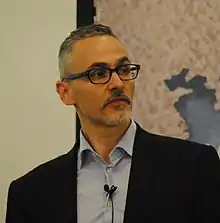David Halpern (psychologist)
David Solomon Halpern[1] FAcSS (born June 1966[1]) is a British civil servant, heading the Behavioural Insights Team (unofficially known as the Nudge Unit) spun out from the Cabinet Office.[2]

Education
Halpern attended King's School, Rochester, before attending Christ's College, University of Cambridge achieving a 1st[3] in natural Sciences specialising in experimental psychology. He then went on to complete a PhD in social and political sciences, also at St John's College, Cambridge.[2]
Career
Halpern was a research fellow at the Policy Studies Institute (1991–94), a Nuffield College, Oxford prize research fellow (1993–96) and a lecturer in social human sciences at the University of Cambridge (1996–2001).[2]
From 2001 to 2007 Halpern was chief analyst in the Prime Minister's Strategy Unit. He was then director of the Institute for Government from 2008 to 2010, where he remains a senior fellow.
Since October 2010 Halpern has been director of the Behavioural Insights Team, initially as part of the Cabinet Office and since 2013, as a partially privatised venture.[4][2][5]
He currently is a visiting professor at King's College London.[6]
He is one of the 56 individuals named by the UK government as contributing to the Scientific Advisory Group for Emergencies in response to the COVID-19 pandemic in the United Kingdom, focusing on behavioural changes such as increased handwashing.[7] On 11 March 2020 he gave an interview to the BBC on the importance of shielding vulnerable people during the COVID-19 pandemic until herd immunity had been achieved.[8]
Honours
In 2016, Halpern was elected a Fellow of the Academy of Social Sciences (FAcSS).[9]
Selected works
He has authored or co-authored four books as well as a number of reports:
References
- https://beta.companieshouse.gov.uk/company/08567792/officers
- Benjamin, Alison (5 February 2013). "David Halpern: 'We try to avoid legislation and ordering'". Guardian. Retrieved 27 July 2014.
- https://www.linkedin.com/in/david-halpern-09202111/?originalSubdomain=uk
- "Whitehall 'Nudge unit' to be part privatised". BBC. 1 May 2013. Retrieved 27 July 2014.
- "Institute for Government – our people". Institute for Government. Retrieved 27 July 2014.
- "King's College London Halpern". Retrieved 23 November 2016.
- Hutton, Robert (11 March 2020). "Keep Calm and Wash Your Hands: Britain's Strategy to Beat Virus". Bloomberg News. Retrieved 12 March 2020.
- Freeman, Lawrence. "The real reason the UK government pursued "herd immunity" – and why it was abandoned". www.newstatesman.com (1 APRIL 2020). NS Media Group. New Statesman. Retrieved 20 April 2020.
- "Eighty-four leading social scientists conferred as Fellows of the Academy of Social Sciences". Academy of Social Sciences. 19 October 2016. Retrieved 5 August 2017.
- "Options for Britain II". Retrieved 27 July 2014.
- Halpern, David (2015). Inside the Nudge Unit: How small changes can make a big difference. WH Allen. ISBN 978-0-7535-5653-5.
- MINDSPACE report (PDF). 2010.